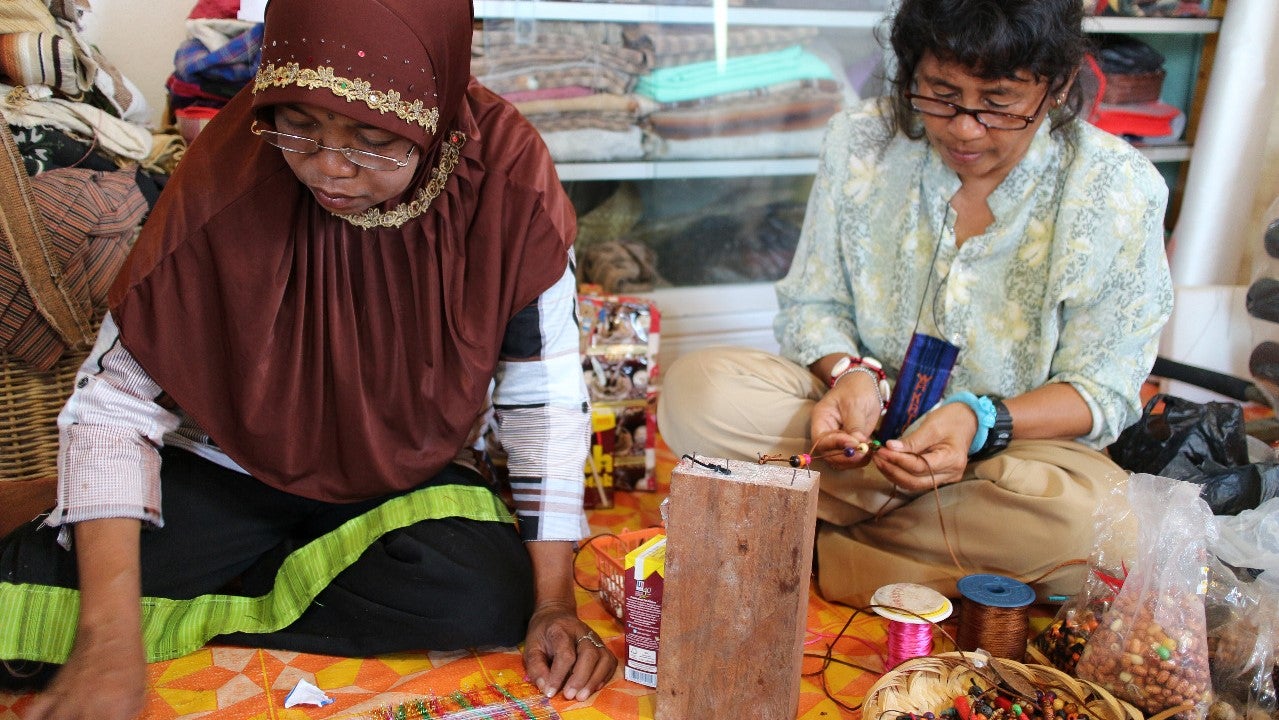 Wirausaha perempuan di Wakatobi, Sulawesi Tenggara, sedang membuat produk kerajinan.
Wirausaha perempuan di Wakatobi, Sulawesi Tenggara, sedang membuat produk kerajinan.
Indonesia’s economy is changing, opening more and better opportunities for women. However, compared to countries at similar income levels, Indonesia’s women are slightly less likely to be participating in the economy. In Indonesia, 54 percent of working-age women are active in the labor force compared to 82 percent of working-age men. Perhaps more interesting is that this rate has been relatively stagnant for the last 20 years.
The fact that more women are not working in Indonesia is especially puzzling given progress in the educational attainment and declines infertility. In terms of test scores, girls today are on par or outpacing boys at every level of education through tertiary education. However, this is not translating into more and better jobs for women. And despite declines in fertility rates, most women drop out of the labor market after marriage. Many of those who drop out, do not return.
With two-thirds of Indonesia’s female population today in the productive age group of 15-64 years old, there is enormous potential for accelerating growth by removing barriers to their economic participation . For example, if Indonesia could increase female labor force participation by just 25 percent by 2025, it could generate an additional $62 billion in economic activity and boost GDP by 2.9 percent.
The COVID-19 pandemic has hit women particularly hard. Many women in Indonesia, and globally, are employed in vulnerable sectors, such as in retail, hospitality, or the garment sector, which has seen significant job losses and reduced hours since the start of the pandemic. Even more women are informal workers, where the impacts are difficult to capture, and access to social support systems is limited.
Further, women are often the last to see economic opportunities return. After the Asian Financial Crisis, women’s unemployment remained several percentage points above men’s unemployment rates for nearly a decade. A World Bank assessment after the Sulawesi earthquake showed that, as jobs returned, most went first to men. If economic recovery programs are gender blind, they might leave women even further behind.
So what can be done?
Harnessing the power of women and enhancing their economic participation would be smart economic policy for recovery. An emphasis on skills and job creation that taps the country’s female labor force would not only support greater short-term growth, it would also ensure investments in human capital are fully realized. This could focus on the following areas.
First, efforts to support Indonesia’s progress in closing gaps in labor markets could include addressing legal, socio-cultural, and economic factors that shape women’s opportunities for economic participation. For instance, the wage gap for women in the formal sector is 30 percent, and is up to 50 percent in the informal sector, with much of the differences attributed to discriminatory practices. Closing gender gaps such as these can help to retain women in the labor force, improve productivity and accelerate economic growth.
Second, treating caregiving as essential infrastructure. Investing more and better in Early Childhood Education could also have significant positive impacts on the participation of women in the labor market. Recent analysis done by the World Bank in Indonesia shows that an additional public preschool per 1,000 children raises the employment of mothers by 13 percent. Giving more mothers better access to childcare they can trust is thus a good policy choice for Indonesia. It will also have additional positive benefits for child welfare and development so this is a win-win solution.
Lastly, Indonesia already boasts a vibrant network of women entrepreneurs. Despite making up a large and growing share of the self-employed in Indonesia, women continue to operate smaller and less productive enterprises than men. However that doesn’t need to be the case. Leveraging digital financial tools, bundling financial products and technical support services, and looking at alternatives to collateral requirements can help to spur growth and job creation.
Indonesia has many strong women in leadership positions, and the country is on the right track as it continues to acknowledge and accept the crucial roles that women play in developing the nation so far. Looking ahead, closing gender gaps further is not only the right thing to do by women – it is a good policy to boost Indonesia’s economic recovery.
This article has been published as opinion piece in Kompas, March 8, 2021


Join the Conversation